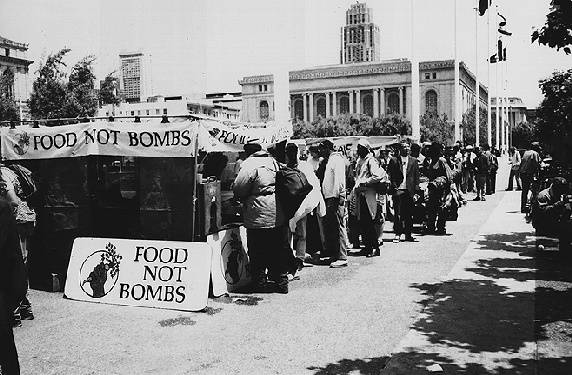A CHARITY OPERATION, TOO: Difference between revisions
No edit summary |
(added page content type, linked to FNB loop, protected) |
||
| Line 1: | Line 1: | ||
'''<font face = Papyrus> <font color = maroon> <font size = 4>Historical Essay</font></font> </font>''' | |||
''by Geoffrey McDonald'' | |||
[[Image:polbhem1$fnb-civic-center-2.jpg]] | [[Image:polbhem1$fnb-civic-center-2.jpg]] | ||
| Line 9: | Line 13: | ||
In publicly opposing Matrix, FNB became "champions" of the homeless; even a lot of the homeless saw them that way ("those saint-like men [sic]" as one homeless poet put it in [[39,000 Matrix Cases Dismissed!|''Street Sheet'']]). Without intending to--in fact, deliberately trying not to--FNB replicates the same processes of manipulation and passivity as any other charity, even if in a harmless way. However laudable the intention of helping the poor, symbolic acts are usually more meaningful to the giver than the recipient. At worst, it can lull highly dedicated young people into a false sense of "doing something." It isn't really an accomplishment to attract a crowd of poor folks with give-aways; and by that measure, FNB is notoriously unreliable. | In publicly opposing Matrix, FNB became "champions" of the homeless; even a lot of the homeless saw them that way ("those saint-like men [sic]" as one homeless poet put it in [[39,000 Matrix Cases Dismissed!|''Street Sheet'']]). Without intending to--in fact, deliberately trying not to--FNB replicates the same processes of manipulation and passivity as any other charity, even if in a harmless way. However laudable the intention of helping the poor, symbolic acts are usually more meaningful to the giver than the recipient. At worst, it can lull highly dedicated young people into a false sense of "doing something." It isn't really an accomplishment to attract a crowd of poor folks with give-aways; and by that measure, FNB is notoriously unreliable. | ||
[[FNB Activists|More Food Not Bombs]] | |||
[[SURPLUSES and DISTRIBUTION |Prev. Document]] [[Union of Concerned Commies 1979-1980, agit-prop theater and flyers |Next Document]] | [[SURPLUSES and DISTRIBUTION |Prev. Document]] [[Union of Concerned Commies 1979-1980, agit-prop theater and flyers |Next Document]] | ||
[[category:Dissent]] [[category:food]] [[category:Civic Center]] [[category:1990s]] [[category:1980s]] | [[category:Dissent]] [[category:food]] [[category:Civic Center]] [[category:1990s]] [[category:1980s]] | ||
Revision as of 01:01, 8 January 2009
Historical Essay
by Geoffrey McDonald
Food Noot Bombs at Civic Center. No cops.
According to FNB's spokespeople, the repression of FNB is part of the general assault on the rights of the homeless. In FNB's ideology, no difference exists between the activists and the people they serve. In truth, there is a good deal of overlap between what many oddly call the "homeless community" and the group as a whole. Many homeless people find roles in the group as mechanics, cooks, or just couch-surfers. Food Not Bombs is resolutely inclusive. But this open endedness exacts a price. The psychoses of street-life seriously hamper the organization's ability to function. Theft, sexual harassment and drug abuse are common crises; and crisis itself is FNB's normal mode. Its endless meetings are dominated by private demons; adherence to consensus not only tolerates but encourages dissolute raving in the name of democracy, exacerbating the tendency to forego tactical debate for group therapy.
This is supposed to be empowering. In truth, the relationship of homeless individuals to the group is parasitic. It could hardly be otherwise: for the homeless, life is a desperate scramble to stay alive. While there is nothing radicalizing about their misery, for FNB activists, identification with the plight of the homeless is a source of righteousness. But the fact is that no matter how much FNB may aspire to be "of" the homeless, the hard work is done by idealistic middle-class white kids, and whatever vow of poverty they may take, they are definitely on the giving end in their relationship to the poor.
In publicly opposing Matrix, FNB became "champions" of the homeless; even a lot of the homeless saw them that way ("those saint-like men [sic]" as one homeless poet put it in Street Sheet). Without intending to--in fact, deliberately trying not to--FNB replicates the same processes of manipulation and passivity as any other charity, even if in a harmless way. However laudable the intention of helping the poor, symbolic acts are usually more meaningful to the giver than the recipient. At worst, it can lull highly dedicated young people into a false sense of "doing something." It isn't really an accomplishment to attract a crowd of poor folks with give-aways; and by that measure, FNB is notoriously unreliable.

